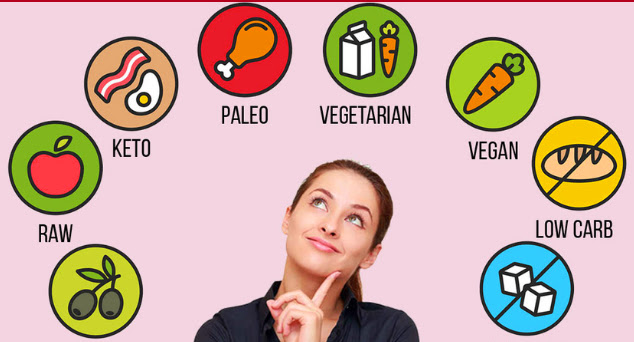How to choose the most suitable diet type for you?
When it comes to losing weight, there are countless diet types out there to
choose from. Each one has its own set of rules and restrictions, but they
all have the same goal: to help you shed those extra pounds. In this
article, we'll take a look at some of the most famous diet types and compare
their results in a table. We'll also discuss the role of
nutrition
in weight control and how it affects the success of these
diets.
-
The Atkins Diet is a low-carb, high-fat diet that was first introduced in
the 1970s. The idea behind the diet is to reduce your carbohydrate
intake while increasing your fat and protein intake. By doing this,
your body enters a state of ketosis, where it burns fat for energy instead
of carbohydrates. The Atkins Diet has been shown to be effective
for weight loss, but some experts warn that it may not be sustainable
in the long term.
-
The Mediterranean Diet is a plant-based diet that focuses on whole,
unprocessed foods. It's rich in fruits, vegetables, whole grains, and
healthy fats such as olive oil and nuts. The diet has been associated with
numerous health benefits, including weight loss, reduced risk of
heart disease, and improved brain function.
-
The Paleo Diet is based on the idea that our bodies are better
adapted to the diet of our hunter-gatherer ancestors. The diet focuses on
whole, unprocessed foods and eliminates grains, legumes, and dairy. The
Paleo Diet has been shown to be effective for weight loss, but some
experts question its sustainability in the long term.
-
The Vegan Diet eliminates all animal products, including meat, dairy, and
eggs. Instead, it focuses on plant-based foods such as fruits, vegetables,
whole grains, and legumes. The diet has been associated with numerous
health benefits, including weight loss, reduced risk of heart disease, and
improved digestion.
Now, let's take a look at how these diets compare in terms of their
results:
|
Diet Type |
Pros |
Cons |
|
Atkins Diet |
Fast weight loss, reduced appetite |
May not be sustainable long term, may increase risk of heart
disease |
|
Mediterranean Diet |
Sustainable, associated with numerous health benefits |
May not result in as rapid weight loss as other diets |
|
Paleo Diet |
Effective for
weight loss, eliminates processed foods |
May not be sustainable long term, may be difficult to follow for
vegetarians or vegans |
|
Vegan Diet |
Associated with numerous health benefits, sustainable |
May require careful planning to ensure adequate nutrient intake,
may be difficult to follow for those who are used to a meat-based
diet |
It's important to note that the success of any diet depends on a number of factors, including individual preferences, lifestyle, and medical conditions. However, one thing that all of these diets have in common is the importance of nutrition in weight control.
Nutrition plays a crucial role in weight control because it affects our metabolism, appetite, and energy levels. A diet that's rich in whole, nutrient-dense foods is more likely to keep us feeling full and satisfied, which can help prevent overeating. Additionally, a balanced diet that includes all of the essential nutrients can help us maintain a healthy weight and reduce the risk of chronic diseases such as diabetes and heart disease.
There are many different diet types out there, each with its own set of pros and cons. While some diets may be more effective than others for weight loss, the most important factor is finding a diet that's sustainable and meets your individual needs and preferences. And regardless of which diet you choose, remember that good nutrition is key to maintaining a healthy weight and reducing the risk of chronic disease.
How can I ensure I'm getting all the essential nutrients on a vegan diet?
Ensuring adequate nutrient intake on a vegan diet requires careful planning and attention to your food choices. Here are some tips to help you get all the essential nutrients on a vegan diet:
Include a variety of foods in your diet: Eating a variety of whole, plant-based foods is the best way to ensure you're getting all the necessary nutrients. This includes fruits, vegetables, whole grains, legumes, nuts, and seeds.
Pay attention to protein: Protein is an essential nutrient that plays a crucial role in building and repairing tissues. While animal products are a common source of protein, there are plenty of vegan sources as well, such as beans, lentils, tofu, tempeh, seitan, nuts, and seeds. Make sure to include a variety of these foods in your diet.
Get enough vitamin B12: Vitamin B12 is only found in animal products, so it's important for vegans to supplement or eat fortified foods. Many plant-based milks, cereals, and nutritional yeast products are fortified with vitamin B12. You can also take a B12 supplement.
Pay attention to calcium: Calcium is important for bone health, and while dairy products are a common source, there are plenty of plant-based sources as well. Good vegan sources of calcium include leafy green vegetables, fortified plant-based milks, tofu, and almonds.
Don't forget about iron: Iron is important for oxygen transport in the body, and while animal products are a common source, there are plenty of vegan sources as well. Good vegan sources of iron include beans, lentils, tofu, nuts, seeds, and fortified cereals.
Consider omega-3s: Omega-3 fatty acids are important for brain and heart health, and while fish is a common source, there are vegan sources as well. Good vegan sources of omega-3s include flaxseeds, chia seeds, hemp seeds, and walnuts.
Consult a registered dietitian: If you're new to a vegan diet or have concerns about meeting your nutrient needs, consider consulting a registered dietitian who can help you develop a balanced meal plan.
By following these tips and being mindful of your food choices, you can ensure that you're getting all the essential nutrients on a vegan diet.
Can you recommend any vegan sources of vitamin B12 supplements?
Yes, there are several vegan sources of vitamin B12 supplements that you can consider. Here are a few options:
Cyanocobalamin supplements: Cyanocobalamin is a synthetic form of vitamin B12 and is commonly used in vitamin supplements. Many brands offer vegan vitamin B12 supplements that use cyanocobalamin.
Methylcobalamin supplements: Methylcobalamin is another form of vitamin B12 that is sometimes used in supplements. It's considered more bioavailable than cyanocobalamin, meaning it's easier for the body to absorb.
Nutritional yeast: Some brands of nutritional yeast are fortified with vitamin B12, making them a good source of the nutrient for vegans.
Plant-based milks: Many plant-based milks, such as soy milk, almond milk, and oat milk, are fortified with vitamin B12.
Vegan multivitamins: If you're looking for a comprehensive supplement that includes vitamin B12 along with other essential nutrients, consider a vegan multivitamin. Many brands offer vegan options.
When choosing a vitamin B12 supplement, make sure to read the label carefully to ensure that it is vegan-friendly. If you have any concerns or questions, it's always a good idea to consult with a healthcare professional or registered dietitian.
Can you recommend any vegan sources of omega-3 supplements?
Yes, there are several vegan sources of omega-3 supplements that you can consider. Here are a few options:
Algal oil supplements: Algal oil is derived from algae and is a vegan source of omega-3s. Many brands offer vegan omega-3 supplements that use algal oil.
Flaxseed oil supplements: Flaxseed oil is a plant-based source of omega-3s. It's important to note that the body doesn't convert the type of omega-3 in flaxseed oil (ALA) as efficiently as the type found in fish (EPA and DHA). However, it can still be a good source of omega-3s for vegans.
Chia seed supplements: Chia seeds are a plant-based source of omega-3s. Like flaxseed oil, they contain ALA, which the body doesn't convert as efficiently as EPA and DHA. However, they can still be a good source of omega-3s for vegans.
Hemp seed oil supplements: Like flaxseed oil and chia seeds, hemp seed oil is a plant-based source of omega-3s that contains ALA.
Vegan omega-3 supplements: If you're looking for a comprehensive supplement that includes omega-3s along with other essential nutrients, consider a vegan omega-3 supplement. Many brands offer vegan options that use a combination of algal oil, flaxseed oil, and other plant-based sources of omega-3s.
When choosing an omega-3 supplement, make sure to read the label carefully to ensure that it is vegan-friendly. If you have any concerns or questions, it's always a good idea to consult with a healthcare professional or registered dietitian.
More about vegan options.
Vegan options refer to foods that are free from any animal products or by-products, including meat, dairy, eggs, and honey. A vegan diet typically consists of whole, plant-based foods such as fruits, vegetables, whole grains, legumes, nuts, and seeds. There are also many vegan-friendly alternatives available for common animal-based foods, such as plant-based milks, cheeses, and meat substitutes.
Here are some examples of vegan options:
Plant-based milks: Soy milk, almond milk, oat milk, and coconut milk are all vegan options that can be used as a dairy milk alternative.
Vegan cheese: There are many vegan cheese options available, made from ingredients such as nuts, soy, or tapioca starch.
Meat substitutes: Vegan meat substitutes such as tofu, tempeh, seitan, and textured vegetable protein (TVP) can be used in place of meat in recipes.
Nutritional yeast: Nutritional yeast is a vegan-friendly source of vitamin B12 and can be used as a cheese substitute in recipes.
Legumes: Chickpeas, lentils, black beans, and other legumes are high in protein and can be used in place of meat in recipes.
Whole grains: Brown rice, quinoa, bulgur, and other whole grains are great sources of complex carbohydrates and can be used in a variety of dishes.
Nuts and seeds: Almonds, cashews, walnuts, chia seeds, flaxseeds, and other nuts and seeds are high in healthy fats and can be used in recipes or as snacks.
Vegan options can be a healthy and delicious way to meet your nutrient needs while also supporting animal welfare and the environment. If you're new to a vegan diet, it's important to make sure that you're getting all the necessary nutrients by including a variety of whole, plant-based foods in your diet and considering supplementation as needed.
Recommend any vegan sources of CALCIUM AND IRON supplements?
Yes, there are several vegan sources of calcium and iron supplements that you can consider. Here are some options:
Vegan sources of calcium supplements:
1.Algae-based calcium supplements: Some brands offer calcium supplements derived from algae, which can be a vegan-friendly source of calcium.
2.Calcium-fortified plant-based milks: Many plant-based milks, such as soy milk, almond milk, and oat milk, are fortified with calcium.
3.Calcium-fortified orange juice: Some brands of orange juice are fortified with calcium.
4.Vegan calcium supplements: Many brands offer vegan calcium supplements that use a variety of plant-based sources of calcium, such as calcium citrate, calcium carbonate, or calcium gluconate.
Vegan sources of iron supplements:
1.Iron-fortified cereals: Many breakfast cereals are fortified with iron, and can be a good source of the nutrient.
2.Iron-fortified plant-based milks: Some plant-based milks are fortified with iron, which can be a good source of the nutrient.
3.Iron-fortified nutritional yeast: Some brands of nutritional yeast are fortified with iron, making them a good source of the nutrient.
4.Vegan iron supplements: Many brands offer vegan iron supplements that use a variety of plant-based sources of iron, such as iron bisglycinate or iron fumarate.
It's important to note that while supplements can be a useful way to meet your nutrient needs, it's always best to try to get your nutrients from whole, nutrient-dense foods whenever possible. If you're concerned about your nutrient intake, consider consulting with a healthcare professional or registered dietitian who can help develop a personalized plan to meet your needs.








0 Comments